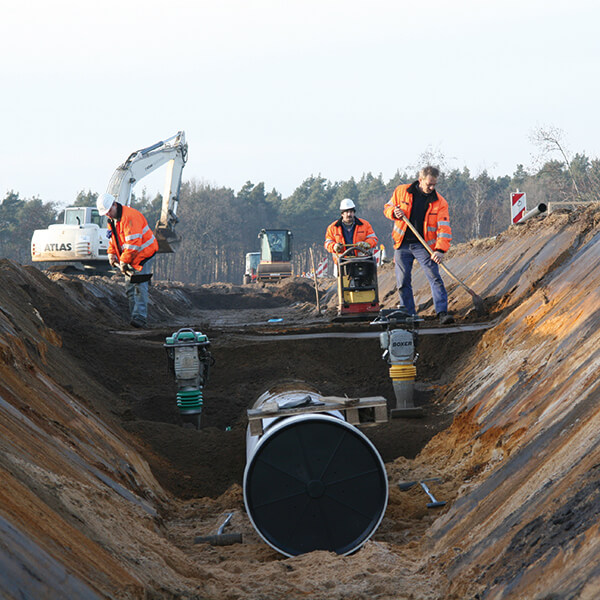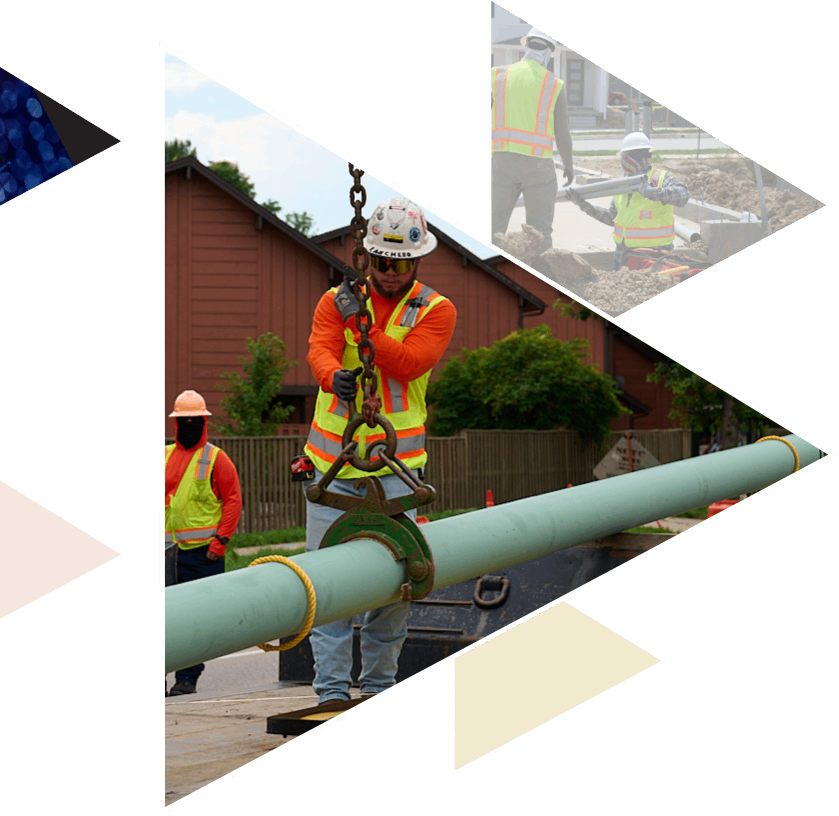Top Mistakes to Avoid When Selecting Pipeline Construction Services
Wiki Article
The Vital Overview to Understanding Pipeline Construction Services and Their Relevance
Pipeline Construction services are essential to the transport of necessary sources such as water, oil, and gas. These solutions involve thorough preparation and execution, sticking to rigorous safety and security and environmental requirements. As the market adapts to contemporary challenges, recognizing its effects and components comes to be increasingly important. What elements add to the expanding relevance of these solutions in today's economic situation? The complying with areas will check out these crucial elements.Review of Pipeline Construction Services
Pipeline Construction services include a range of tasks crucial for the setup and upkeep of pipes used to transport numerous materials, including water, oil, and gas. These services are vital for ensuring the effective and secure motion of sources from one place to one more. The process normally starts with complete preparation and design, which takes into consideration regulatory requirements, environmental factors to consider, and logistical difficulties.Once preparation is full, excavation and grading of the land are conducted to prepare the website for Pipeline setup. This is complied with by the actual laying of the pipelines, which includes welding or joining sections together to produce a continual circulation course. After installment, rigorous screening is done to ensure integrity and security. Maintenance solutions are likewise provided to address any kind of problems that may emerge with time. In general, Pipeline Construction solutions play a critical role in supporting infrastructure for power and water distribution.
Trick Parts of Pipeline Construction
An effective Pipeline Construction job counts on several crucial parts that assure the risk-free and efficient installment of the Pipeline system. First, extensive website analyses are important, as they determine the geographical and environmental factors that may impact Construction. Next off, the selection of appropriate materials, such as pipes and installations, is crucial for safeguarding longevity and compatibility with the transferred substances.Furthermore, advanced Construction methods, including trenchless innovation and directional exploration, boost effectiveness and lessen ecological influence. Reliable project management is one more vital component, working with labor, equipment, and timelines to meet project goals.
In addition, communication amongst stakeholders, including designers, contractors, and local authorities, guarantees alignment on job specifications and requirements. Ultimately, complete quality assurance procedures throughout the Construction process ensure conformity with market requirements and optimize the Pipeline's operational life expectancy. Collectively, these elements create the foundation of an effective Pipeline Construction task.
Safety Specifications and Rules in Pipeline Construction

Boosting Regulative bodies, such as the Occupational Safety And Security and Health Management (OSHA) and the Pipeline and Hazardous Materials Safety And Security Administration (PHMSA), established forth certain demands that govern Construction practices. These consist of methods for devices use, worker training, and emergency situation action treatments. By carrying out these standards, Construction business not only safeguard their staff members but also secure public trust. Eventually, extensive safety steps add to the long-term success of Pipeline tasks, guaranteeing they meet both functional and environmental assumptions.
Ecological Considerations in Pipeline Projects

Environmental factors to consider are essential to the preparation and implementation of Pipeline projects. These jobs need to assess possible effect on ecological communities, water resources, and regional wildlife. Conducting thorough ecological influence analyses (EIAs) is important, permitting stakeholders to determine and minimize dangers prior to Construction begins.
Securing delicate areas, such as habitats and wetlands, typically needs executing certain style features or alternate transmitting to lessen disturbance. Furthermore, Pipeline operators are tasked with establishing strategies for stopping spills and leakages, which can have disastrous effects on the atmosphere.
Interaction with neighborhood areas is necessary, as public worries can result in task adjustments that enhance environmental management. Conformity with regulations set by environmental agencies guarantees that tasks fulfill sustainability criteria, cultivating an equilibrium between infrastructure requirements and environmental preservation. Eventually, resolving environmental considerations not just safeguards nature but also advertises neighborhood count on and task practicality.
The Duty of Innovation in Pipeline Construction
Modern technology plays an important function in contemporary Pipeline Construction, improving efficiency and precision. Advanced evaluating techniques permit precise preparation and implementation, decreasing environmental influence and project delays. In addition, the combination of automation and robotics improves procedures, lowering labor expenses and improving safety and security on Construction websites.Advanced Evaluating Techniques
Advanced surveying strategies play a vital function in the effective execution of Pipeline Construction tasks. These methods take advantage of innovative technology to guarantee accurate mapping and evaluation of the surface where pipes will be set up. Techniques such as Geographic Information Systems (GIS), LiDAR (Light Detection and Ranging), and 3D modeling enable engineers to analyze the landscape and imagine, recognizing possible obstacles and environmental problems. By utilizing these sophisticated devices, teams can enhance precision in positioning and alignment, significantly decreasing the danger of errors throughout Construction. Additionally, real-time information collection enables instant changes and educated decision-making throughout the project lifecycle. Inevitably, these checking developments add to enhanced efficiency, security, and sustainability in Pipeline Construction initiatives.Automation and Robotics

Economic Influence of Pipeline Infrastructure
Pipeline framework plays an essential function in helping with and shaping regional economies profession. By giving a trusted ways of transporting oil, gas, and various other commodities, pipelines reduce transportation prices and boost supply chain effectiveness. This infrastructure draws in investment, stimulates work development, and fosters economic development in surrounding locations.Additionally, the Construction and maintenance of pipes contribute significantly to neighborhood economic climates, creating countless employment possibility in different fields, from engineering to labor. The increase of work frequently leads to increased spending in regional businesses, further bolstering economic task.
In addition, pipelines improve power protection by guaranteeing a stable supply of resources, which is essential for residential demands and industrial operations. As regions end up being interconnected via Pipeline networks, they gain accessibility to more comprehensive markets, boosting competitiveness and financial durability. As a result, the economic effect of Pipeline infrastructure is multifaceted, affecting both instant local economic situations and wider local development.
Future Fads in Pipeline Construction Solutions
The future of Pipeline Construction solutions is advancing in action to technical improvements, regulative my sources changes, and growing ecological considerations. Technologies such as drones and robotics are simplifying inspection and maintenance procedures, enhancing safety and performance. Automation is poised to decrease labor prices and enhance accuracy in Construction procedures. In addition, the enhancing focus on sustainability is motivating companies to embrace environmentally friendly materials and techniques, lining up with global initiatives to decrease carbon impacts.Regulative frameworks are additionally adapting to attend to environmental influences, promoting better openness and accountability in Pipeline projects. The combination of basics wise modern technologies, including real-time surveillance systems, is expected to enhance the reliability and efficiency of Pipeline networks. As energy demands shift towards renewable sources, Pipeline Construction services will likely see a surge in jobs associated with biofuels and hydrogen transport. Generally, these trends indicate a transformative period for the Pipeline Construction industry, concentrated on advancement and sustainability.
Often Asked Concerns
What Kinds of Pipelines Are Generally Built?
Various sorts of pipes are commonly built, including oil, water, gas, and sewage pipes - Pipeline Construction Services. Each serves distinctive objectives, promoting the transport of important sources throughout regions while adhering to security and environmental policiesFor how long Does a Typical Pipeline Job Take?
The period of a typical Pipeline project differs substantially, frequently ranging from numerous months to a few years. Aspects affecting this timeline include task complexity, governing authorizations, and ecological factors to consider that should be attended to.Who Manages Pipeline Construction Firms?
Pipeline Construction firms are managed by numerous federal, state, and neighborhood companies, including the Pipeline and Hazardous Materials Security Administration (PHMSA) and state public utility compensations, making certain compliance with security and environmental standards throughout the Construction process.What Are Common Materials Utilized in Pipeline Construction?
Usual materials made use of in Pipeline Construction include pvc, steel, and polyethylene. Each product supplies unique advantages such as resilience, resistance, and versatility to rust, making them appropriate for various applications in moving gases and fluids.
Just How Are Pipeline Construction Prices Approximated?
Pipeline Construction costs are estimated by examining factors such as material costs, labor prices, job complexity, environmental considerations, and regulatory needs (Pipeline Construction Services). Accurate price evaluation assurances effective budgeting and project planning throughout the Construction procedurePipeline Construction solutions include a variety of activities essential for the setup and maintenance of pipes made use of to carry different materials, consisting of gas, oil, and water. A successful Pipeline Construction task relies on a number of essential components that ensure the secure and reliable installment of the her comment is here Pipeline system. Advanced checking techniques play a vital role in the effective implementation of Pipeline Construction projects. Various kinds of pipelines are commonly constructed, consisting of oil, water, sewage, and gas pipes. Pipeline Construction expenses are estimated by examining variables such as material costs, labor prices, job complexity, environmental considerations, and regulative requirements.
Report this wiki page